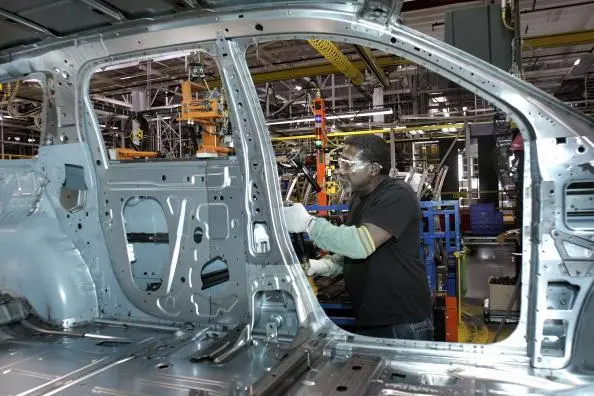PHOTO
SHANGHAI- Shanghai's COVID-19 lockdown roiled auto production on Tuesday as a major supplier joined Tesla in shutting a plant to comply with measures to control the spread of the coronavirus.
General Motors Co's joint venture in Shanghai maintained production by asking workers to sleep on factory floors and getting passes for trucks to continue deliveries, two people familiar with the matter said.
A key auto supplier, Aptiv PLC, told workers at one of its Shanghai facilities that supplies Tesla and GM's Shanghai joint venture to head home on Tuesday because of the need to enforce COVID controls, people briefed on the measure said.
The Aptiv closure came on the second day of a lockdown in Shanghai, home to 26 million people and a major hub for manufacturing of vehicles and other goods. The city has instituted tough controls on movements of people to try to control the spread of the highly infectious Omicron variant.
The lockdown, one of the biggest tests for China's "zero-COVID" strategy, has forced automakers and suppliers to either try to adapt with extreme measures to keep factories running or to shut down and risk delayed shipments at a time when demand for vehicles is strong.
German auto supplier Bosch on Tuesday said its two plants in Shanghai are working with reduced personnel. "We are doing everything we can to maintain the supply chains as much as possible and to serve the demands of our customers," the company said in a statement.
For global automakers and suppliers, the latest coronavirus-related disruptions in China, the world's largest market, are piling on top of problems created by the war in Ukraine.
The measures GM took to keep its Shanghai plant open equate to a "closed-loop" management process, which China's financial hub has asked companies to adopt to stay open during a two-stage lockdown to battle its outbreak.
In the bubble-like arrangement, workers sleep, live and work in isolation from the rest of the world to prevent virus transmission. A similar system was used at the Winter Olympics in Beijing to seal event personnel off from the public.
The facilities, which GM runs as part of a joint venture with Chinese state-owned automaker SAIC Motor Corp, produce Buick, Chevrolet and Cadillac vehicles. The facilities are in areas east of Shanghai's Huangpu River that have been locked down from Monday to Friday.
CONTINGENCY PLANS
GM, which said on Monday that its Shanghai joint venture was producing normally, declined to comment on the arrangements at its factory. A spokesperson said the company and its joint ventures had developed and were executing contingency plans with their suppliers to mitigate uncertainty related to COVID-19. SAIC did not have immediate comment.
SAIC-GM's ability to keep its Shanghai production lines running contrasts with that of Tesla Inc, which Reuters reported has suspended production for the four-day period. It was unable to secure sufficient provisions for its workers to achieve closed-loop management, one source said.
The workers at the affected Aptiv site were told to stay home on Wednesday and await further notice, the four sources told Reuters. Two of the sources said the affected compound produces for Tesla and GM's Shanghai joint venture with SAIC.
Aptiv's Shanghai facilities are in the west of the city and had not been affected by the city's lockdown, which started in eastern districts. The sources said the workers at the affected facility had been told that it had to shut due to COVID-19 issues.
Aptiv declined to comment on the production suspension. "I can confirm that we are following all government orders and not impacting customers' production," an Aptiv spokesperson said. Tesla, GM and SAIC did not have immediate comment.
Apple supplier Foxconn, TCL Corp, and Apple supplier Shenzhen Deren Electronic Co Ltd managed to keep production going in southern China this month with closed-loop management after manufacturing hubs such as Shenzhen and Dongguan were hit by similar lockdown measures.
(Reporting by Zhang Yan and Norihiko Shirouzu; writing by Brenda Goh; editing by Paul Simao and Jonathan Oatis)





















